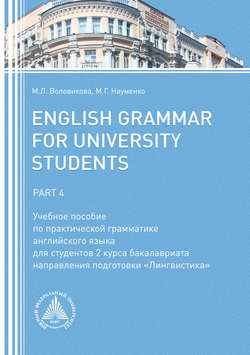Читать книгу English Grammar for University Students. Part 4 - Марина Воловикова, М. Г. Науменко - Страница 2
Module 1. The infinitive
ОглавлениеNON-FINITE FORMS OF THE VERB. GENERAL CHARACTERISTICS
Verb forms fall into two classes: finites and non-finites, the latter are also called verbals, verbids. There are four non-finite forms of the verb in the English language: the Infinitive, the Present Participle (Participle I), the Past Participle (Participle II), and the Gerund.
Non-finite forms of the verb have double nature, they possess the characteristics of the verb together with the characteristics of other parts of speech. They have some verbal categories: voice, aspect, and temporal correlation; but they lack the categories of person, number, mood, and tense [Кобрина,Корнеева, 2009].
The verbal nature of non-finite forms is also revealed in combinability. Similar to finite verbs they may take direct, indirect, and prepositional objects, adverbial modifiers, and subordinate clauses.
Verbals cannot be a predicate in the sentence but they can be used as part of a compound predicate. They may form predicative constructions which consist of two elements: a noun or a pronoun and a verbal. They are in predicative relation that resembles the relation of the subject and the predicate.
I would like you to play with the child.
I saw him cross the street.
Father had his car repaired yesterday.
The non-verbal nature of non-finites may be seen in their syntactical functions. The Infinitive and the Gerund perform the syntactical functions of subject, object and predicative that are similar to the syntactical functions of the noun. Participle I may function as part of a compound nominal predicate (predicative), attribute, and adverbial modifier; Participle II may function as attribute and predicative.
THE INFINITIVE
The Infinitive is the form of the verb which expresses a process in general, and is known as the initial form of the verb.
The Infinitive may be used with the particle to. Sometimes the particle is separated from the Infinitive by other words, e.g. an adverb (split Infinitive).
This separation is usually used for the purpose of emphasis.
You have to really watch him.
Historically, the Infinitive is a verbal noun. That is why it combines the features of the verb with those of the noun.
The verbal features of the Infinitive are manifested in its morphological and syntactical characteristics.
1. It possesses the grammatical categories of voice, aspect and temporal correlation.
It was too dark to read the map and we took the wrong turning.
You’re not supposed to be reading this.
Fleming, Tolkien and CS Lewis are the authors that British people most claim – falsely – to have read.
This is a book to be read by everybody taking this course!
Why do some new messages appear to have been read when I haven’t opened them yet?
She was seen to have been reading the new book in the garden.
2. The Infinitive possesses the verb combinability:
a) The Infinitive of transitive (переходные) verbs takes a direct object.
Alex may send (transitive verb) a postcard (direct object) from Argentina.
3. The Infinitive can be modified by adverbials.
She agreed to leave the room quickly and quietly.
The nominal character of the Infinitive is manifested in its syntactical functions.
To drive fast in such weather is pretty dangerous (subject).
Their duty will be to look after the children (predicative).
I asked her to explain everything (object).
I have no desire to go there (attribute).
